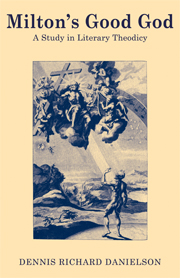Book contents
- Frontmatter
- Contents
- Preface
- 1 The contexts of Milton's theodicy
- 2 God and Chaos
- 3 Assertion and justification: providence and theodicy
- 4 Milton and the Free Will Defense
- 5 Theodicy, free will, and determinism
- 6 Eden and the “soul-making” theodicy
- 7 Paradise Lost and the Unfortunate Fall
- Epilogue
- Appendix: The unfortunate fall of Satan
- Notes
- Selected bibliography
- Index
6 - Eden and the “soul-making” theodicy
Published online by Cambridge University Press: 04 August 2010
- Frontmatter
- Contents
- Preface
- 1 The contexts of Milton's theodicy
- 2 God and Chaos
- 3 Assertion and justification: providence and theodicy
- 4 Milton and the Free Will Defense
- 5 Theodicy, free will, and determinism
- 6 Eden and the “soul-making” theodicy
- 7 Paradise Lost and the Unfortunate Fall
- Epilogue
- Appendix: The unfortunate fall of Satan
- Notes
- Selected bibliography
- Index
Summary
Having indicated ways in which Milton's literary handling of certain issues connected with the problem of evil creates difficulties, I would like in this chapter to present one of Milton's most original and successful theodical contributions. I argued generally in Chapter 1 that literature can impinge on theology; and what I shall seek to do now is to show how the particular literary act of presenting life in Eden informs and enriches Miltonic theodicy as a whole, as well as to suggest how theodicy in turn motivates and shapes Milton's presentation of the conditions – especially the prelapsarian conditions – “necessary to the constituting of human vertue.” I shall also examine briefly possible sources and analogues for his presentation and comment on its significance in the history of ideas.
“Soul–making” versus “Augustinian” theodicy
I would like to begin by making what is perhaps an obvious point: The Fall is largely a relative term; how it is conceived depends on what man fell from and what he fell to. Pre– and postlapsarian are, in turn, except in the purely literal, chronological sense, also relative notions, because the better the prelapsarian state is imagined to have been, the worse the postlapsarian state will appear; and the worse the postlapsarian state is believed to be, the greater will seem the benefits that man enjoyed before the Fall.
- Type
- Chapter
- Information
- Milton's Good GodA Study in Literary Theodicy, pp. 164 - 201Publisher: Cambridge University PressPrint publication year: 1982

